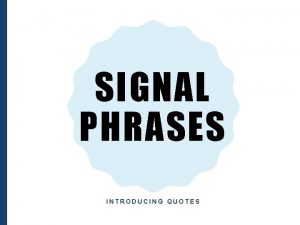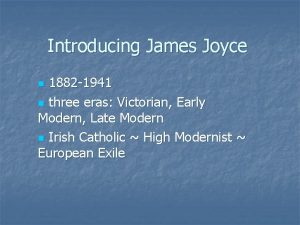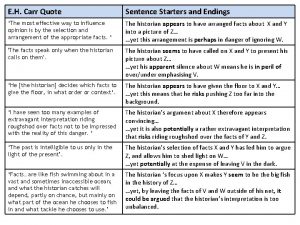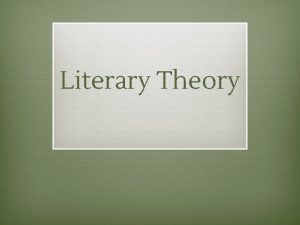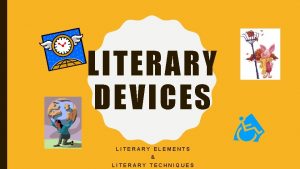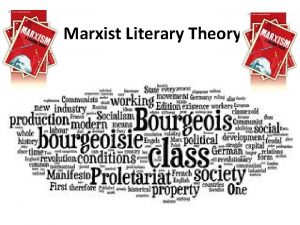INTRODUCING LITERARY THEORY What is a literary theory






- Slides: 6

INTRODUCING LITERARY THEORY What is a literary theory? A literary theory is a “lens” or a “perspective” in which a reader reads the text given. Depending on which theory is used, their interpretation of the text can change. 4 THEORIES WE WILL BE EXAMINING- Psychoanalytic theory, Marxist theory, Feminist theory and Post- Colonial theory

INTRODUCING LITERARY THEORY PSYCHOANALYTIC THEORY IN A NUTSHELL Psychoanalytic criticism adopts the methods of “reading” employed by Freud and later theorists to interpret texts. It argues that literary texts, like dreams, express the secret unconscious desires and anxieties of the author, that a literary work is a manifestation of the author’s own neuroses. One may psychoanalyze a particular character within a literary work, but it is usually assumed that all such characters are projections of the author’s psyche. Like psychoanalysis itself, the critical reader seeks evidence of unresolved emotions, psychological conflicts, guilts, ambivalences, and so forth within what may well be a disunified literary work. The author’s own childhood traumas, family life, sexual conflicts, fixations and such will be traceable within the behaviour of the characters within the literary work. But psychological material will be expressed indirectly, disguised, or encoded (as in dreams) through principles such as “symbolism” (the repressed object represented in disguise), “condensation” (several thoughts or persons represented in a single image), and “displacement” (anxiety located onto another image by means of association).

INTRODUCING LITERARY THEORY MARXIST THEORY IN A NUTSHELL Karl Marx (1818 -1883) examined social organization in society and he perceived human history to have consisted of a series of struggles between classes- between the oppressed and the oppressors. He was considered the father of Communism- a way of running an economy and the government in which the means of production (the factories, equipment, the things which allow other things to be produced) are commonly owned, and where there are no social classes. Communism says that the people of any and every place in the world should all own the factories and farms that are used to make goods and food and be able to make decisions about them together. THIS notion is opposite to the idea of Capitalism where the state has little involvement in the how things are produced, distributed, marketed, how much to charge for products and what wages to give to workers. This is called the “free market”. Marxist literary theory examines how issues of social class within the capitalistic model impact the characters and society at large.

INTRODUCING LITERARY THEORY FEMINIST THEORY IN A NUTSHELL Feminist literary criticism, arising in conjunction with sociopolitical feminism, critiques patriarchal language and literature by exposing how these reflect masculine ideology. It examines gender politics in works and traces the subtle construction of masculinity and femininity, and their relative status, positionings and marginalizations within works. Feminist criticism concerns itself with stereotypical representations of genders. It also may trace the history of relatively unknown or undervalued women writers, potentially earning them their rightful place within the literary canon, and helps create a climate in which women’s creativity may be fully realized and appreciated. One will frequently hear the term “patriarchy” used among feminist critics, referring to traditional male-dominated society. “Marginalization” refers to being forced to the outskirts of what is considered socially and politically significant; the female voice was traditionally marginalized, or discounted altogether.

INTRODUCING LITERARY THEORY POST-COLONIAL THEORY IN A NUTSHELL Colonialism: The imperialist expansion of Europe into the rest of the world during the last 400 years in which a dominant imperium or center carried on a relationship of control and influence over its margins or “colonies”. This relationship tended to extend to social, pedagogical, economic, political and broadly cultural exchanges often with a hierarchal European settler class and local, educated elite class forming layers between the European “mother” nation and the various indigenous peoples who were controlled. Such a system carried within it inherent notions of racial inferiority and exotic “otherness”. Post-Colonialism: Broadly a study of the effects of colonialism of cultures and societies. It is concerned with both how European nations conquered and controlled “third world” cultures and how these groups have since responded to and resisted those encroachments. Post-colonialism, as both a body of theory and a study of political and cultural change, has gone and continues to go through three broad stages: 1) an initial awareness of the social, psychological and cultural inferiority enforced by being in a colonized state 2) the struggle for ethnic, cultural and political autonomy 3) a growing awareness of cultural overlap and hybridity.

ACTIVITY: You will be split up into groups of 4, with each group being given a particular literary theory. As a group, you will work on understanding the information given for yourselves. You will then (on one or two pieces of chart paper), write a condensed and somewhat simplified version of the information given for your particular theory and you will present this info to the rest of the class. Your presentation should last at least 6 minutes and be a maximum of about 10. In order to do this, in addition to simply WRITING a summary, you are asked to employ any of one or more of the following creative techniques to help with clarification and understanding of the literary theory assigned and its key terms: - Create diagrams -create a short skit - Draw doodles or cartoons to represent ideas -create a short song or poem - Colour code information -use symbols or pictures - Play a short music or video clip of something that relates etc.
